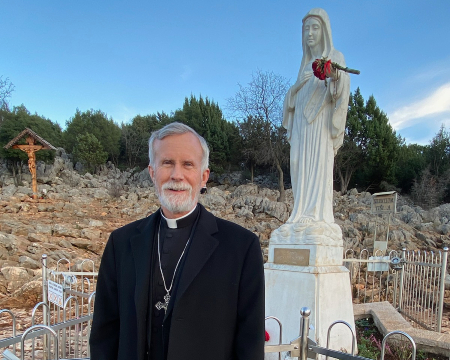Countdown to the Conclave, Day 13: The Conclave in the Social Media Era
FREE Catholic Classes
Some priests and prelates proudly proclaim their ignorance of the virtual world by refraining from the use of email or the Internet, much less Facebook and Twitter: Such a stance is no longer charmingly eccentric, it is irresponsible, like ignoring the influence of television, radio, and film on human lives.
We ask you, humbly: don't scroll away.
Hi readers, it seems you use Catholic Online a lot; that's great! It's a little awkward to ask, but we need your help. If you have already donated, we sincerely thank you. We're not salespeople, but we depend on donations averaging $14.76 and fewer than 1% of readers give. If you donate just $5.00, the price of your coffee, Catholic Online School could keep thriving. Thank you.Help Now >
Highlights
Catholic Online (https://www.catholic.org)
3/11/2013 (1 decade ago)
Published in Europe
Keywords: social media, twitter, cardinals, conclave, internet, google, Deal W hudson, Deacon Keith Fournier
WASHINGTON, DC (Catholic Online) - Most Biblical commentators have treated the saying of Jesus from Luke 12:2 as a prophecy about the End Times. However, the so-called Digital Age, with the Internet, Twitter, Facebook, Google, and "Googling," what Jesus described in apocalyptic terms, seems to have virtually arrived:
"Therefore whatsoever ye have spoken in darkness shall be heard in the light; and that which ye have spoken in the ear in closets shall be proclaimed upon the housetops."
No information, no utterance, no action, nothing we do or say, or have done or said in the past is guaranteed to be private. Privacy, as we have known it -- at least those of us who are over 50 years old -- no longer exists and will never exist again.
Events of the past, once studied in vast, dusty libraries or on bulky, eye-curdling microfilm, are available to anyone in a matter of moments if they have any idea what they are looking for. The crimes and sins of the past, like heroes and their heroics, are now virtually at our fingertips. Time travel, to a great extent, is no longer the dream it once was.
The Internet, coupled with search engines, has removed the impulse to create a time machine, so easy is it to revisit past generations by spending hours connected to the virtual timeline of history which can be constructed on the Internet, an ever-expanding library of libraries.
What is true for the past in the Digital Age is even more true for the present. Significant events, whether revolutions in Egypt, genocide in Syria, presidential campaigns, school massacres, celebrity meltdowns, and papal Conclaves become virtually present, if not in real time, with only a short delay. It's as if some invisible censor, with his finger on a 60 second time delay, was deciding what the world could or could not see, but always deciding to show everything.
The papal Conclave to convene on Tuesday will not be exempt from the hyper-scrutiny and the immediacy of the social media in the Digital Age. Fox News describes the "virtual conclave" that has been created by the vast network of twittering cardinals, real time postings on Facebook, and the plethora of instantaneous postings by journalists and observers at the Vatican. In what must be a "first" in the history of the Church, the Archbishop of Bogata, Cardinal Ruben Salazar Gomez, tweeted that he wanted to know what those following his tweets wanted in a new pontiff: "I would very much like your feedback," he wrote.
As the world knows, Benedict XVI had created a Twitter account before the announcement of his retirement, and about two dozen cardinals are known to be actively tweeting, a number that is sure to rise rather steeply in months and years to come.
Fox reports that many of the cardinals are "googling" the prospective "papabile": Let's hope the cardinals know how to separate fact from fiction on the Internet. Unless you have spent many, many hours reading information in the virtual world, it's difficult to tease out the tell-tale signs of the "trolls" at work; that is, those who deliberately spread misinformation or misleading information.
Having used the Internet ourselves, to gather information on the Conclave and the 115 participating cardinals, it's clearly evident that the "trolls" have been hard at work trying to defame several of the more orthodox front runners.
Wikipedia, for all its virtues, is far from being invulnerable to misinformation attacks -- and once discovered it takes a concentrated effort, not always successful, to have the hacked entries restored.
Some priests and prelates proudly proclaim their ignorance of the virtual world by refraining from the use of email or the Internet, much less Facebook and Twitter: Such a stance is no longer charmingly eccentric, it is irresponsible, like ignoring the influence of television, radio, and film on human lives.
This Conclave will choose the new pope in an era of unparalleled electronic surveillance and commentary: Let's hope those in charge of the proceedings are ahead of the curve rather than continue to lag far behind.
---
'Help Give every Student and Teacher FREE resources for a world-class Moral Catholic Education'
Copyright 2021 - Distributed by Catholic Online








 Daily Readings for Saturday, April 20, 2024
Daily Readings for Saturday, April 20, 2024 St. Marian: Saint of the Day for Saturday, April 20, 2024
St. Marian: Saint of the Day for Saturday, April 20, 2024 Children's Prayer For Parents: Prayer of the Day for Saturday, April 20, 2024
Children's Prayer For Parents: Prayer of the Day for Saturday, April 20, 2024


